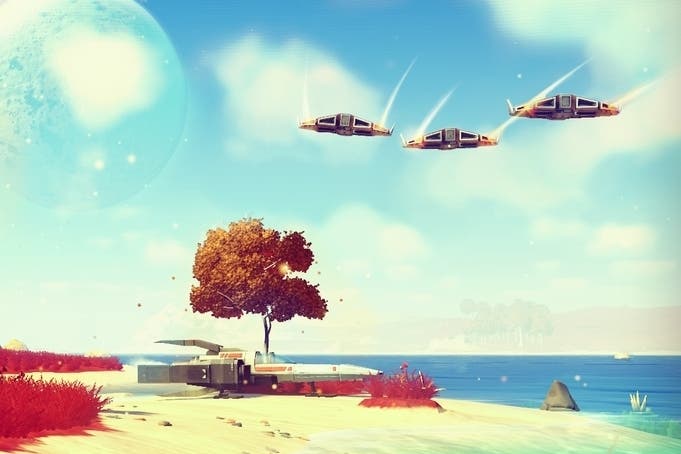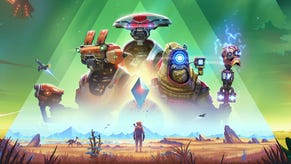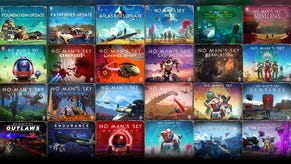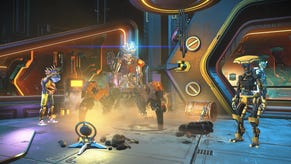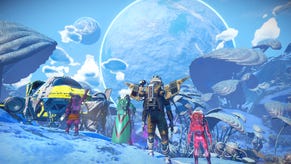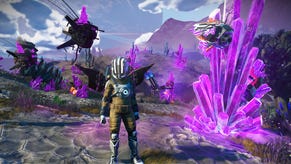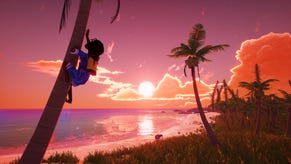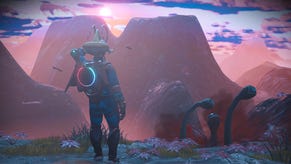"A future that has a history": Introducing No Man's Sky
The stars my destination.
If you're on Mars next October you should probably be careful. There's a comet swinging past - comet Siding Spring - and while it's unlikely to connect with Big Red itself, it will bring glittering meteors spinning in its wake. Lots of meteors, actually - some of which - and I shivered when I read this line on the front page of the New Scientist website - "could pose a danger to orbiting spacecraft."
That's a wonderful phrase, but I'm afraid I've turned it over a few times and the thrill of it quickly gives way to disappointment. You won't be on Mars next October, not with the best will in the world, even if you called in absolutely every favour you had coming to you. And those orbiting spacecraft? They won't be carrying any humans either. When it comes to outer space, we're not onto our training wheels yet. We don't even know what training wheels look like - and when we do find out, the things they entail will probably briskly kill us with radiation.
So the idea of the human race spreading out across a dynamic galaxy bright with beauty and violence is just that at the moment, an idea. No Man's Sky is a game born of a similar idea - and, I suspect, a similar disappointment. Disappointment's certainly the overarching theme when I catch up with the team making it, anyway. "We wanted to make a science fiction game, and I don't feel that anyone has really made what I consider a real science fiction game," says Sean Murray, the project's lead. He's not finished. According to Murray, the luminously romantic skyboxes of games like Halo are "fake", and the next-gen promise of new hardware has been swallowed by big games with tiny imaginations. "We're moving further and further down that path where you feel like a camera that is just on rails slowly pushing forward," he laughs. It's not a particularly happy sort of laugh.
At the very least, No Man's Sky aims to ditch the rails. You've seen the trailer by now, I hope - the astonishingly bold VGX reveal video that starts in the depths of the New Eridu Ocean (discovered by someone called Hazel, right), tracking shark-things as they scatter shoals of fish-things, before we move outwards, through the surf and onto a desert island where red grass waves in the breeze and at least two moons hover overhead. A spaceship awaits, engines idling. Hop in! Up to the clouds. Up through the clouds, banking over the glittering sea and then deep into space where a battle is being fought, where massive hardware hangs weightless, and where contrails muddle with laser beams. Just the kind of stuff that could, you know, pose a danger to orbiting spacecraft.
This is what disappointment gets you - the new project, I'm both delighted and bewildered to report, from Hello Games. That's the tiny team that made those delightful Joe Danger stunt racers, the most recent of which gave a decent amount of screen time to a cupcake riding a bike. A while back, after Joe Danger 2 was finished, I interviewed Murray and asked him about the kind of things the studio wanted to do next. He told me that the next-gen would be a very different place for indies, and they would have to think much bigger in order to survive. Got it, I nodded. He's probably thinking about adding cars and maybe even lorries to his stunt racers. He's probably thinking about a gateaux riding a bike.
Not exactly. Instead, he was building a vast procedural universe, granular in detail right to the ocean floors of the most inconsequential of planetoids. A place alive with danger wherever you point your first-person camera. A vast celestial food chain serving the needs of your inner naturalist. A huge, massively-distributed exploration puzzle inspiring your inner cartographer. How many people are working on this? I ask Murray today, after the short reveal video has finished playing for the second time. "Four people," he tells me. There are more people handling the parking at your average wedding.
So anyway, back to that disappointment. Can you really argue that nobody's made a proper science fiction game yet? "Not one that matches my view of what science fiction is," says Murray. "My view is what I grew up with, which is book covers - that's what I picture as science fiction. Often quite colourful, quite vibrant, quite exciting to look at. A mixture of all the authors you can think of, Heinlein, Clarke, Asimov, but also Chris Foss, the actual artist behind them. That's how I picture those worlds.
"There are films like Star Wars that capture a little piece of that," he admits. "In games we tend to focus on the darker side of it. Dark skies and grey spaceships and space marines. But that for me is more science fantasy, I guess. The kind of worlds we deal in in video games are not the kind of worlds you'd want to explore. The kind of science fiction we grew up with doesn't exist here, and we want to create those landscapes. We want to create that feeling and that emotion, and that sense of wonder. What we wanted to get across was a kind of frontiersmanship. A sense of mystery. A future that has a history."
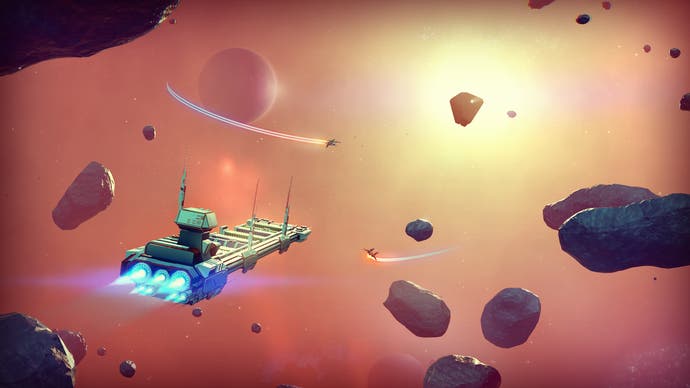
Frontiersmanship! This isn't going to be straightforward either. "No Man's Sky is a game about exploration, and I guess nobody's really captured what I feel about the real meaning of exploration too," says Murray. "In games it's like: someone has planted a puzzle piece backwards from where you start. You go backwards and there's the cave and you find the puzzle piece and everyone has the same experience. But for me, exploration is seeing something that no-one's seen before and for your experience to be unique."
And so the idea starts to come together. It's not a particularly small idea. In fact, you could probably call it the Last Great Science Fiction Video Game Pitch: a procedural universe for you to bomb around inside, making discoveries and getting into scrapes. Downed ships, space battles in asteroid fields, giant worms cruising through the sands of some backwater hellhole - these are cliches for sure, but that's the whole point. They're the best cliches the genre can offer, and for once they're all connected, linked together, obeying the same handful of rules and first principles, and all the more alive because of it. Imagine an Elite with the power to take you down onto the surface of planets so you could explore the terrain. Imagine an Elite where you can use your blasters to drill a hole through an asteroid and see what's inside.
Speaking of cliches, have a go at this one. "So if you were stood on a mountain and you can see a tree three miles away you can go and you can walk and you can see that tree and what's under it," Murray tells me. "But also if you look into the sky and you see that classic science fiction crescent planet on the horizon, you can go there as well. And if you see a star that's in the sky, given enough time you can go and look at that as well. You can look at the night sky and all of those stars are actually real things, they are real places, and you can have visited some of them but not visited others. Grant [Duncan, the art director] said it the other day. 'Is this the first game that doesn't have a skybox?' It's such a weird thing, it's such a techie thing, but that should be our opener: the first game with no skybox."
So how will you orientate yourself in such a massive, bewildering place? In truth, it might come fairly naturally - for starters, you won't be alone. Everyone who plays No Man's Sky will begin the adventure on their own planet at the edge of a shared galaxy. For most people, the obvious hook will be to carve a path to the centre of the galaxy where there will be something waiting for them. Along the way, you'll discover that this universe has rules, and you'll have to work together with other players - other frontiersmen - to find out how the place fits together and how it all works. You'll be building from scratch, too. When you initially load up the galaxy map, all the systems and planets are there, but nothing's labeled. Filling in the blanks is up to you - up to everyone.
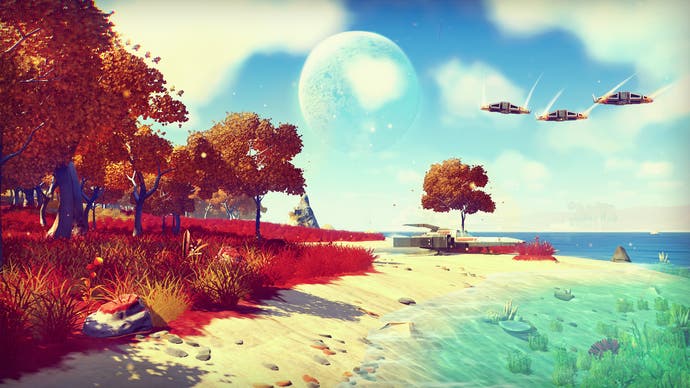
This sounds a bit like MirrorMoon EP, Santa Ragione's gorgeous and mysterious Noctis-'em-up from earlier this year, although, granted, it sounds like a version that's been massively expanded in every possible direction. There's a very different texture in place, though. In this universe, the sense of wonder and discovery is sharpened by threat.
"Games that I think we will get compared to, rather than that I would compare us to?" asks Murray. "Those games would be Minecraft, DayZ, but also in terms of gameplay, I think Dark Souls to an extent, and probably Journey to an extent. There's obviously touches of things like Eve and all the space games in there, but we want to have a very different take on that.
"The universe as such will be a really dangerous place for you," he continues. "It will start out not so dangerous, but as you try to journey to the centre of the galaxy, things will mutate a lot more and will make your gameplay experience much more dangerous. Undertaking that trip will require lots of preparation. It will require you to, without going into too much detail, build up your character, build up your ship. I don't know how much I want to say about how you go about doing that, but you will have to co-operate with other people to make that journey. You will feel very vulnerable in this universe, and not necessarily empowered, but you will have the ability to travel great distances very fast and you have a lot of freedom." He pauses for a second, considering things. "A lot of freedom but maybe not masses of power."
Speaking of power, does a team of just four people (for now, anyway) have the clout to tackle this kind of project? Isn't No Man's Sky too big, too unwieldy?
"Something that's really interesting right now in games is that, in theory, that power can be used not just powering this massive juggernaut that's like traditional retail games with hundreds of people working on Assassin's Creed," argues Murray. "Not just to give them a little extra clout and tweak things slightly and make things look slightly better so we have little video comparisons split down the middle. I guess what we see is an opportunity to use that for a really small team to make something that's really interesting and hopefully really quite different. Take the procedural stuff. There's a tendency to think of procedural as randomness and kind of a mess, but it's really not."
"When we first started working on this, I was always a little bit sceptical about procedural generation," says Duncan, who's been sat nodding along throughout. "Especially as an artist, you always look especially at landscapes, and you think: that doesn't look like it's had the extra love and polish to make something feel like an experience. Procedural stuff is always: I'm walking over a hill. Still walking. Now here's a mountain. Still walking. That's been my fear all along.
"But there's definitely procedural gameplay experiences where you can work out what made something fun, then work backwards and ask what made that happen, and then put that into the system too. It's about making those second-to-second gameplay things happen. You can then plug that into the planets and it creates these situations."
"I've had to fool Grant into working on this game," says Murray. "He'd create concepts and then we'd be in the crazy situation where we had to try and recreate concepts. Now we're in a position to do that. Moments in the game look like those book covers. There are crashed ships in places, and that's because ships have crashed there. There are moments that feel very reminiscent of Dune, and they're just happening for natural reasons. The trailer has been enormously hard to capture because everything that happens kind of only happens once. You only get one shot at it."
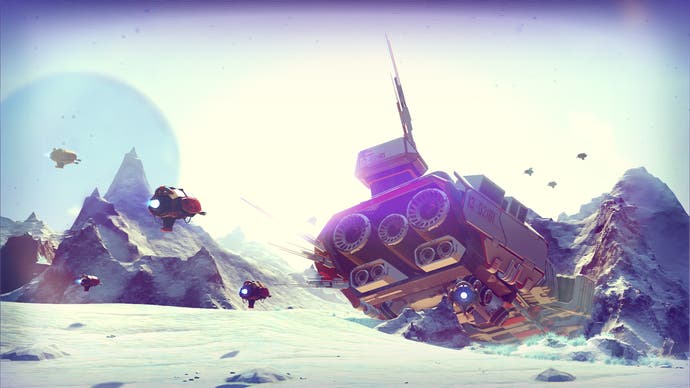
He folds his arms. "So is four people enough?" he asks. "Maybe not, but I know a few things that I've been thinking about recently, I know that when I was working at EA, if I'd pitched this game, we'd have said it was too ambitious, we'd have said it requires more than 100 people. In fact, you couldn't schedule it out.
"I think it's actually only a small team that would make a game like this. I couldn't picture the kind of mindset that would be involved to undertake it at EA or whatever. It wouldn't be a very easy sell. I don't think it would get off the ground. It's only a small group that would be stupid enough to try to do it."
Interesting argument, that, particularly in the light of how our presentation wraps up. One of the accepted rules in the strange relationship between developers and the games press is that the former never actually asks the latter what they think about things. People break this rule all the time, of course, and there's a variety of different reasons for that - none of which come down to a genuine interest in opinion, thankfully. Often, it's purely corporate fishing: what kind of write-up am I going to get? Often it's just polite small talk: I'll ask what you think because I've already enquired as to whether you had trouble getting here on the train. When Murray asks it's for the best reason, I think - the best reason there is for asking a bad question.
He simply wants to make sure that he isn't stupid or - even worse - that he hasn't gone politely but comprehensively insane on this project. He wants proof of some kind that the pains he's taken so far - the pains he's going to take over the coming years of development - are pains worth taking.
And I really believe they are, actually. The fact that a small team is making a pitch for a massive emergent universe with a strong multiplayer component that also manages, along the way, to deliver a genuine sense of wonder seems like a risk you'd want to be involved in. You make so many concessions in life, don't you? So many little sacrifices to the way things are, the way they're likely to go. Even from the kindest of vantage points, I don't know whether my 11-year-old self would be amused at quite how much time I've spent watching the Food Network as my 20s gave way to my 30s, for example.
He'd like the fact that, in the science fiction-sounding year 2013, people were still talking about making the great space exploration game, though. He'd probably like the fact it was a small, knackered team that once had to take its own sofas around to trade events when it showed off its games, too. Succeed or fail, No Man's Sky is a clear bid to create one of those special games that defines a generation. Already, I can't take my eyes off it.
